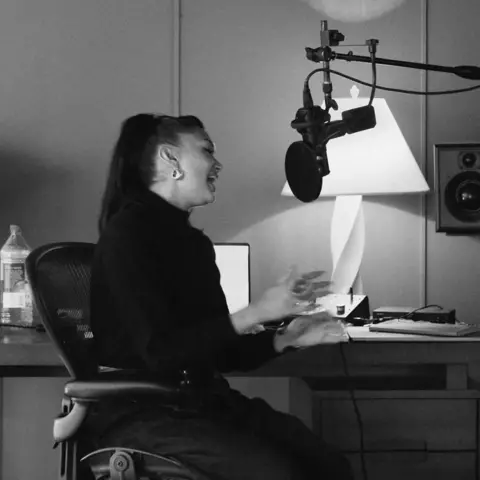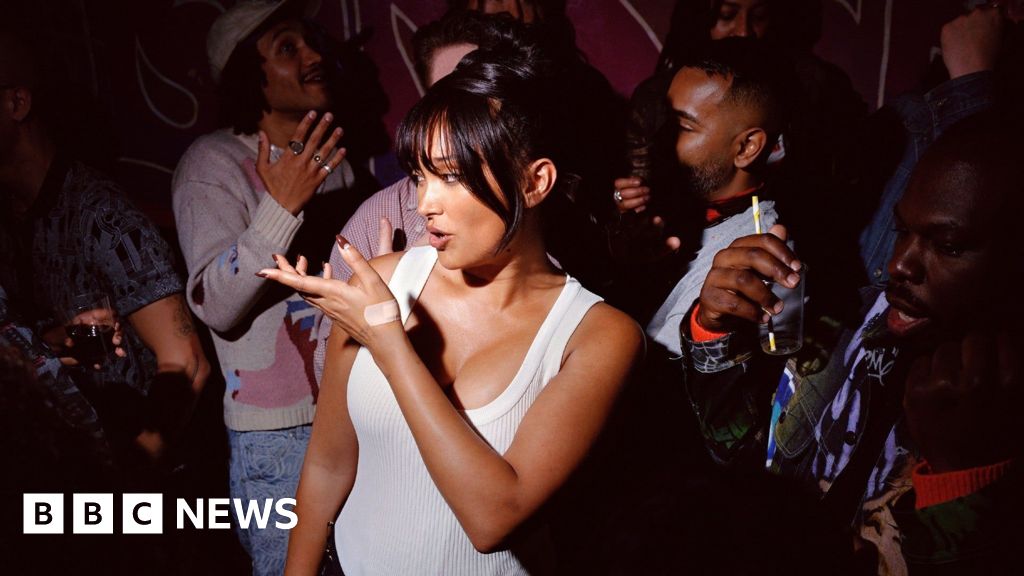Mark SavageMusic correspondent
 Ewen Spencer
Ewen SpencerJoy Crookes knows a thing or two about music.
As a kid, her dad encouraged her to soak up the classics, from Nick Cave and King Tubby to The Pogues and hours of music from Pakistan.
“He’d say, ‘This is from your ends of the world, you should hear this’,” says the singer, who’s of Irish-Bangladeshi heritage.
Before long, she’d bought her first album (Marvin Gaye’s What’s Going On) and uploaded her first cover to YouTube, playing a cheap guitar she bought in Argos.
Her debut album, Skin, was released in 2021, earning a Mercury Prize nomination for its soulful, perceptive ballads. The following summer, Crookes played Glastonbury’s Pyramid Stage for the first time, bursting into tears at the scale of the occasion.
But as a music nerd, who’d devoured back issues of NME magazine as a teenager, she knew what came next: The second album slump.
Except… it never came.
“People think the scary part of your second album is the writing,” she says. “Like, ‘Oh no, what am I going to say?’”
“For me, I’ve always got something to [expletive] say, so it wasn’t that difficult to write.
 Getty Images
Getty ImagesWork on her second album, Juniper, started years ago. Crookes posted demos and early sketches on her Instagram feed in 2022, many of which have made the final track listing. So what took so long?
“Making sure that the songs sounded the way they should, to match the songwriting,” she says. “That was the hard part.”
Take her recent single Perfect Crime. A slinky, smoky dancefloor filler, it finds Crookes giving herself a pep talk as she prepares to plunge back into the dating world.
Fresh and funny and light on its feet – it needed “20 or 30” different takes before she was satisfied.
“It’s incredibly janky but, for me, the jank is the important thing,” she says. If it was polished, it’d ruin the fun of the song.
“If you go through the individual elements, there are crazy moments that make no sense – but that’s what makes the song come together.”
If that makes her sound like an obsessive perfectionist, think again. Other songs on Juniper – from the emotionally exposing Mother, to the brutal break-up ballad Mathematics – were recorded in a single session.
On the album’s philosophical closer, Paris, she even lets herself sing off key – preferring the honesty of that vocal to a more polished, auto-tuned alternative.
“Growing up, my dad used to talk about how Van Morrison would ‘let go’ in his songs – there’s moments in Listen to the Lion and Astral Weeks where he’s just free.
“And I think for the first time ever in my career, and just as a person, I let myself go on this record.”
Anxiety attacks
The journey to accepting those imperfections was rough: There’s a second, more distressing, reason that Crookes’ second album took so long.
The 26-year-old had always suffered from anxiety but, sometime around 2022, it tightened its grip.
After wrapping up the promotion of her debut record, she entered what she describes as a “very hedonistic phase in my personal life”.
“I had very little self worth,” she explains. “I was constantly trying to escape my body and my life.”
During that time, she also found herself in an abusive relationship, the end of which triggered a protracted period of poor mental health.
“The anxiety had become so significant that it had become completely physical,” she says.
“It wasn’t just panic attacks. I couldn’t keep food down. Everything I did involved me having a vomiting attack.”
 Joy Crookes
Joy CrookesWith the help of some “very intrusive” therapy, she began to make a recovery – but it was hard work.
Anxiety had become so familiar that it was like “a part of my family, a part of my friendship group,” she says.
Letting go meant unlearning years of habitual behaviour.
It’s a process she sings about on First Last Dance: “It’s high time you let me go… but breaking up is so hard to do“.
“The song is specifically about the vomiting – and how I cannot let [anxiety] take over that much,” she says.
“So it’s not necessarily, ‘Goodbye anxiety, I can’t have you any more,’ even though I’d love for it to be that simple.
“It’s more like, ‘I can’t have you be so prominent that I physically cannot function’.”
The song marked a turning point – something she illustrates by pairing the subject matter with a feathery, Kylie-esque dance beat.
For the rest of the album, she’s sorting out her priorities.
 Ewen Spencer
Ewen SpencerI Know You’d Kill is a tribute to her manager, Charlie, whose protective instincts kicked in when a person on the fringes of Crookes’ team began behaving in a way that made others “feel unsafe”.
“Charlie said,’ Well, you know I’d kill for you’,” recalls Crookes.
“I couldn’t look at her because she looked like diamonds,” she adds, confessing she may have been on mushrooms at the time. “I had to turn away from her because she was shining so brightly.”
It was a reminder that, as dark as things had become, she had real friends. With their support, and as her mental health improved, Crookes began to rediscover herself.
On the strutting, guitar-driven Somebody To You, she waves goodbye to a suffocating relationship and asks: “Who am I when I’m out of your sight?”
It’s not just about romantic partners, she explains, but the music industry, and public perception.
“I’ve been in this industry since I was a child, and I don’t really want to be defined by just music,” she says.
“I’d like to think that my life is a plethora of things. My identity is complex.”

As if to prove it, she recently made her film debut in Ish – the story of two best friends whose friendship is tested by an ugly and heavy-handed police stop and search.
The role took Crookes, who plays an older sister to the lead character, all the way to the Venice Film Festival, where the movie won the coveted audience award.
She’s had other film offers since, but she has her sights set on being part of Gurinder Chadha’s sequel to Bend It Like Beckham – on the soundtrack, on the screen, “or preferably both”.
The original, which starred Parminder Nagra and Keira Knightley, had a profound impact on her as a child.
“I mean, it literally touches on brownness and Irishness – and you can tell that there was a time where it was meant to be a lesbian story, as well.
“I’m really interested in how [the sequel] turns out,” she says.
For now, though, Crookes is gearing up for the release of Juniper. A testament to her strength, it’s rich and profound, unafraid to confront complexity, but peppered with heart and humour. The second album slump has been sent packing.
Even so, sending the record into the world has prompted mixed emotions.
“When you overcome stuff like that, one minute you feel so proud and the next you feel so sad for yourself that you went through such a hard time,” she reflects.
“It’s what makes releasing this album so euphoric and so sad at the same time.”
The next album, which she’s already working on, will be different. Crookes is happy, relaxed, free. It’s a state of mind she couldn’t have imagined in 2022.
“It’s kind of amazing. I pinch myself every day. I’m making jokes about stuff that would have absolutely floored me two years ago.
“I feel very alive at the moment, and I am so grateful.”

